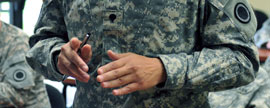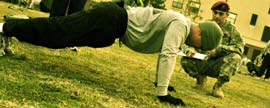Bottom-line
There is no specific regulatory answer that I can find for your question.
Discussion
I personally know of no reason why a leader cannot inspect a profile. The Leader can only determine what a Soldier can and cannot do by examining the profile. Therefore, any leader in the chain of command or leader in charge of the Soldier for example: on a detail would have the authority to check the profile. Just my opinion
Now to the regulations. They are not specific but do speak about commanders having authority. This by extension can in my opinion be extended to the chain of command and leaders in charge of Soldiers. This is my interruption.
DoD 6025.18-R, Jan. 24, 2003 DoD health Information Privacy Regulation
C7.11.1.2. Appropriate Military Command Authorities. For purposes of subparagraph C7.11.1.1., appropriate Military Command authorities are the following:
C7.11.1.2.1. All Commanders who exercise authority over an individual who is a member of the Armed Forces, or other person designated by such a commander to receive protected health information in order to carry out an activity under the authority of the Commander.
AR40-501
AR 40-501 para 7-12 states commanders and personnel officers 7–12. Responsibility for personnel actions a. Unit commanders and personnel officers are responsible for necessary personnel actions, including appropriate entries on personnel management records and the assignment of the individual to military duties commensurate with the individual’s physical profile and recorded assignment limitations.
b. If the soldier’s commander believes the soldier cannot perform with the permanent profile, the commander will make appropriate comments on the profile form in the section entitled “Action by Unit Commander” and request reconsideration of the profile by the profiling physician. Reconsideration must be accomplished by the physician who will either amend the profile or revalidate the profile as appropriate. Commanders may also request a review of temporary profiles
Access to medical records AR 40-66 June 17, 2008/RAR 4 Jan 2010
1–4. Responsibilities
- AMEDD officers. AMEDD officers will—
(5) When serving as division, brigade, or battalion surgeons, AMEDD officers will provide timely and accurate information to support unit commanders’ decision making pertaining to the health risks, medical fitness, and readiness of their Soldiers using the disclosure guidance in chapter 2.
1–6. Record ownership
- Army medical records are the property of the Government. Thus, the same controls that apply to other Government documents apply to Army medical records. (See DODI 6040.43, AR 25–55, AR 25–400–2, and AR 340–21 for policies and procedures governing the maintenance and release of Government documents.)
Chapter 2
Confidentiality of PHI
2–1. General
This chapter explains DA policies and procedures governing the release of PHI pertaining to individual patients. The HIPAA governs the use and disclosure of PHI that is under the control of the MTF/DTF. Once the information is disclosed within the Federal government, it is then protected by the provisions of the Privacy Act of 1974 (AR 340- 21). The policies expressed in this chapter will be used in coordination with those expressed in AR 25–55, AR 340–21, and DOD 6025.18–R. Note that no information pertaining to the identity, treatment, prognosis, diagnosis, or participation in the ASAP will be released, except in accordance with AR 600–85, chapter 6, and chapter 8 of this regulation. Refer to AR 40–68, paragraph 2–5, for information pertaining to the confidentiality of medical quality assurance records.
2–4. Disclosure without consent of the patient
- Requests from personnel within the Department of Defense (DOD). (1) The MTF/DTF may, subject to specific terms and conditions addressed in DOD 6025.18-R, chapter 7, use PHI or disclose PHI to DOD employees who have an official need for access in the performance of their duties in the following situations (without the individual’s authorization or opportunity to object):
(a) When required by law or Government regulation. These are examples of regulatory programs that do not require
a Soldier’s authorization for PHI disclosure. PHI released under these programs will be in accordance with the governing policy as described below.
- To coordinate sick call, routine and emergency care, quarters, hospitalization, and care from civilian providers using DD Form 689 (Individual Sick Slip) in accordance with this regulation and AR 40-400.
- To report results of physical examinations and profiling according to AR 40-501.
- To screen and provide periodic updates for individuals in special programs, such as those described in AR 50-1,
AR 50-5, AR 50-6, and AR 380-67.
-
To review and report according to AR 600-9.
AR 635-40 8 february 2006
4–8. Referral by commanders
When a commander believes that a Soldier of their command is unable to perform the duties of their office, grade,
rank, or rating because of physical disability, the commander will refer the Soldier to the responsible MTF for
evaluation. The request for evaluation will be in writing and will state the commander’s reasons for believing that the Soldier is unable to perform his or her duties. DD Form 689 (Individual Sick Slip) may be used for such referral (AR 40–66). Commanders of Reserve units not on active duty will be guided by AR 40–501 and chapter 8, of this
regulation.
Respectfully
TOP














